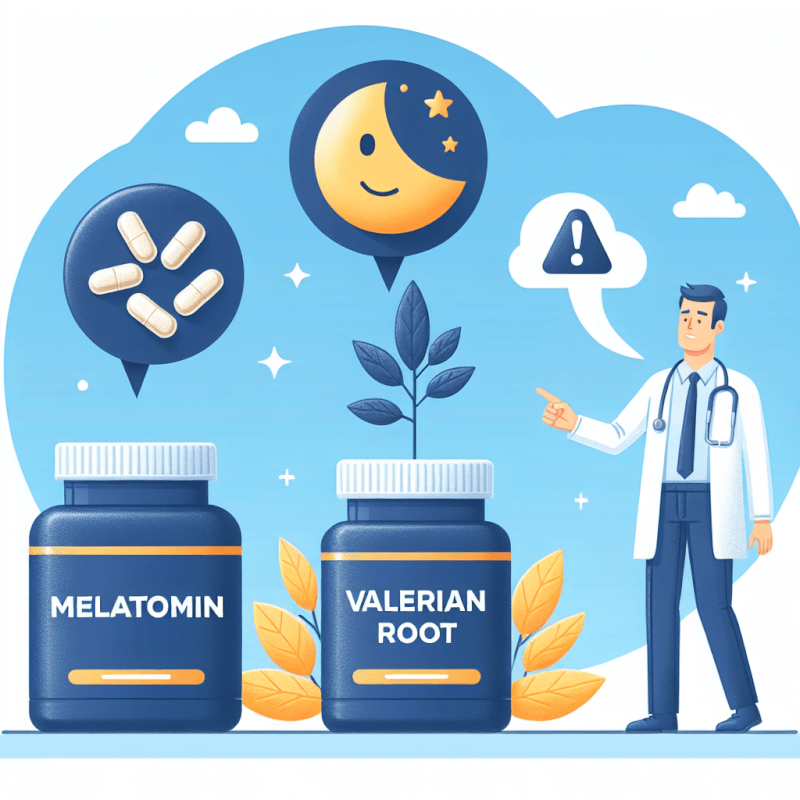Are you tired of tossing and turning every night, desperately seeking a good night’s sleep? If so, you’re not alone. Many people struggle to achieve quality sleep, and sometimes, even a well-balanced diet and soothing bedtime routine aren’t enough. That’s where supplements come in. But with countless options on the market, it can be overwhelming to determine which ones are worth considering. In this article, we will explore a range of supplements that have shown promise in improving sleep quality, helping you wake up refreshed and ready to take on the day.
Melatonin
Dosage and Timing
Melatonin is a hormone that helps regulate sleep-wake cycles in the body. When taken as a supplement, it can be an effective aid for improving sleep quality. The dosage of melatonin varies depending on individual needs and preferences. Generally, a recommended starting dosage for adults is 0.5 to 5 milligrams, taken about 30 minutes to an hour before bedtime. It is important to start with a low dosage and gradually increase if needed. It is always best to consult with a healthcare professional to determine the appropriate dosage for your specific situation.
Side Effects
Melatonin is considered safe for short-term use, but some individuals may experience mild side effects. These can include drowsiness, headache, dizziness, and nausea. It is important to note that melatonin supplements should not be taken if you have a history of seizures, autoimmune disorders, or depression. Additionally, it may interact with certain medications, so it is crucial to seek professional advice if you are taking any prescription drugs.
Effectiveness
Melatonin has been shown to be effective in improving sleep quality, particularly in individuals with insomnia or jet lag. It helps to regulate the body’s internal clock, making it easier to fall asleep and stay asleep throughout the night. However, it is important to note that melatonin is not a sedative and should not be relied upon as a long-term solution for sleep issues. It is best used as a temporary aid, along with implementing healthy sleep habits and addressing any underlying causes of sleep disturbances.
Magnesium
Types of Magnesium
Magnesium is an essential mineral that plays a crucial role in many bodily functions, including sleep regulation. There are several different types of magnesium supplements available, including magnesium citrate, magnesium glycinate, and magnesium oxide. Each type has its own unique properties and absorption rates. Magnesium citrate is often recommended for its bioavailability and ability to promote relaxation, while magnesium glycinate is known for being gentle on the digestive system. It is important to choose the type of magnesium that suits your individual needs and preferences.
Dosage
The recommended daily dosage of magnesium varies depending on age, sex, and individual needs. For adults, the general range is between 300 to 400 milligrams per day. However, it is important to start with a lower dosage and gradually increase, as high doses of magnesium can have a laxative effect. It is also important to consult with a healthcare professional to determine the appropriate dosage for your specific situation.
Benefits for Sleep
Magnesium plays a vital role in the regulation of sleep. It helps activate the body’s parasympathetic nervous system, promoting relaxation and calmness. Magnesium deficiency has been linked to sleep problems, such as insomnia and restless leg syndrome. By supplementing with magnesium, you can help improve sleep quality, enhance sleep duration, and reduce nighttime awakenings. Additionally, magnesium has been shown to have a positive impact on sleep quality in individuals with chronic conditions such as fibromyalgia and chronic fatigue syndrome.

Valerian Root
Traditional Use
Valerian root has a long history of traditional use as a natural sleep aid. It has been used for centuries to promote relaxation and relieve insomnia. Valerian root is derived from the Valeriana officinalis plant and is available in various forms, including capsules, teas, and tinctures. It works by increasing the levels of gamma-aminobutyric acid (GABA) in the brain, which helps to calm the nervous system and promote sleep.
Effectiveness
Valerian root has been studied for its effectiveness in improving sleep quality. Research suggests that it can help individuals fall asleep faster and experience deeper sleep. However, the effectiveness of valerian root can vary from person to person. Some individuals may find significant improvement in their sleep, while others may not experience the same benefits. It is important to note that valerian root may take a few weeks of regular use to achieve optimal results.
Possible Side Effects
While valerian root is generally considered safe for short-term use, some individuals may experience mild side effects. These can include headache, dizziness, upset stomach, and daytime sleepiness. It is important to use valerian root as directed and not exceed the recommended dosage. Valerian root should not be taken in conjunction with other sedatives or alcohol, as it may enhance their effects. It is always best to consult with a healthcare professional before starting any new supplement regimen.
Lavender
Aromatherapy
Lavender is a popular herb known for its calming properties and pleasant scent. Aromatherapy using lavender essential oil has been shown to promote relaxation and restful sleep. Simply adding a few drops of lavender essential oil to a diffuser or pillow spray can create a calming atmosphere that can help prepare your body and mind for sleep.
Oral Supplements
In addition to aromatherapy, lavender is also available in oral supplement form. Lavender supplements typically contain extracts from the lavender plant, such as lavender oil or dried flowers. These supplements can help support relaxation and induce a sense of tranquility, which can contribute to better sleep.
Effectiveness
There is evidence to suggest that lavender, whether used in aromatherapy or taken orally, can improve sleep quality. Research has shown that lavender can help reduce anxiety levels and promote relaxation, leading to improved sleep. It is important to note that individual responses may vary, and some individuals may not experience the same benefits. If you have any concerns or questions, it is advisable to consult with a healthcare professional before using lavender supplements.

Chamomile
Traditional Use
Chamomile is a herb that has been used for centuries as a natural remedy for various ailments, including promoting sleep and relaxation. It can be consumed as a tea or taken in supplement form. Chamomile tea is often recommended as a pre-bedtime ritual to help calm the mind and prepare the body for sleep.
Benefits for Sleep
Chamomile has been recognized for its potential to improve sleep quality. It contains compounds that have mild sedative effects, helping to induce relaxation and reduce anxiety. Chamomile can help individuals fall asleep faster and experience a more restful sleep. It is important to note that while chamomile is generally safe for most individuals, those with allergies to ragweed or related plants should exercise caution when using chamomile products.
Safety Warnings
Chamomile is generally considered safe when used in moderation. However, it is important to note that it may interact with certain medications, including blood thinners and anti-anxiety medications. If you are taking any prescription medications or have any underlying health conditions, it is best to consult with a healthcare professional before incorporating chamomile into your sleep routine.
Glycine
Effect on Sleep Quality
Glycine is an amino acid that plays a role in the production of certain neurotransmitters in the brain, including serotonin and dopamine. Research suggests that supplementing with glycine can improve sleep quality by reducing the time it takes to fall asleep and promoting deeper, more restorative sleep. It can also help regulate body temperature during sleep, contributing to overall sleep comfort.
Dosage Recommendations
The recommended dosage of glycine for improving sleep quality is typically between 3 to 5 grams, taken about an hour before bedtime. It is important to start with a lower dosage and gradually increase if needed. Some individuals may find that lower doses of glycine are effective for them, while others may require higher doses. As always, it is best to consult with a healthcare professional to determine the appropriate dosage for your specific needs.
Additional Benefits
Glycine not only supports better sleep, but it also has other potential health benefits. It has been shown to have anti-inflammatory properties, which can help reduce inflammation and promote overall wellness. Additionally, glycine has been linked to improved cognitive function and may support mental clarity and focus. While more research is needed, glycine shows promise as a multi-purpose amino acid for promoting both sleep and overall well-being.

5-HTP
How It Works
5-HTP, or 5-Hydroxytryptophan, is a naturally occurring compound that is converted into serotonin in the brain. Serotonin is a neurotransmitter that plays a crucial role in regulating mood, sleep, and appetite. By supplementing with 5-HTP, you can boost serotonin levels, which can have a positive impact on sleep quality.
Dosage and Safety
The recommended dosage of 5-HTP for improving sleep is typically between 100 to 300 milligrams, taken about 30 minutes to an hour before bedtime. It is important to start with a lower dosage and gradually increase if needed. It is also advisable to consult with a healthcare professional to determine the appropriate dosage for your specific situation. 5-HTP is generally considered safe for short-term use, but it is not recommended for long-term or high-dose use without medical supervision.
Effectiveness for Sleep
Research suggests that 5-HTP can help improve sleep quality by promoting relaxation and reducing anxiety. It has been shown to reduce the time it takes to fall asleep, increase total sleep time, and improve sleep efficiency. While individual responses may vary, many individuals find 5-HTP to be an effective aid for better sleep. However, it is important to note that 5-HTP should not be combined with certain medications, including antidepressants and anti-anxiety medications, without medical supervision.
Ashwagandha
Stress and Sleep
Ashwagandha is an adaptogenic herb that has been used in traditional Ayurvedic medicine for centuries. It is known for its ability to help the body cope with stress and promote relaxation. By reducing stress levels, ashwagandha can have a positive impact on sleep quality and help individuals achieve a more restful sleep.
Dosage and Timing
The recommended dosage of ashwagandha varies depending on the form and concentration of the supplement. Generally, a dosage of 300 to 600 milligrams, taken once or twice a day, is considered effective for managing stress and promoting sleep. It is best to follow the instructions on the product label or consult with a healthcare professional to determine the appropriate dosage for your specific needs. Ashwagandha is generally well-tolerated, but it may interact with certain medications, so it is advisable to seek professional advice if you are taking any prescription drugs.
Other Benefits
In addition to its potential benefits for sleep, ashwagandha offers a range of other health benefits. It has been shown to support immune function, improve cognitive function, and enhance overall well-being. Ashwagandha may also have anti-inflammatory and antioxidant properties, which can contribute to better overall health and vitality. While more research is needed, ashwagandha shows promise as a natural supplement for promoting both stress relief and sleep improvement.

Passionflower
Traditional Use
Passionflower is a plant that has long been used in traditional medicine for its calming and sedative effects. It has a history of use in promoting relaxation and relieving anxiety. Passionflower is available in various forms, including teas, tinctures, and capsules. It works by increasing levels of GABA in the brain, which helps to calm the nervous system and induce sleep.
Possible Effects on Sleep
Passionflower has been studied for its potential to improve sleep quality. Research suggests that it can help individuals fall asleep faster and experience a deeper, more restful sleep. Passionflower may also help reduce anxiety levels, further enhancing its sleep-promoting effects. However, it is important to note that individual responses may vary, and not everyone may experience the same benefits. It is always best to consult with a healthcare professional for personalized advice.
Precautions
Passionflower has generally been well-tolerated, but some individuals may experience mild side effects, including drowsiness, dizziness, and upset stomach. It is important to use passionflower supplements as directed and not exceed the recommended dosage. Passionflower should not be taken in conjunction with other sedatives or alcohol, as it may enhance their effects. If you are taking any prescription medications or have any underlying health conditions, it is advisable to consult with a healthcare professional before incorporating passionflower into your sleep routine.
Conclusion
When it comes to improving sleep quality, there are several supplements that may be worth considering. Melatonin can help regulate sleep-wake cycles and improve sleep quality, while magnesium supports relaxation and reduces insomnia. Valerian root and lavender have long been used for their calming effects, promoting restful sleep. Chamomile offers relaxation benefits and can aid in sleep preparation. Glycine, 5-HTP, ashwagandha, and passionflower all have potential benefits for sleep, each with their unique mechanisms of action. It is important to note that while these supplements can be helpful, they should not replace healthy sleep habits and addressing any underlying causes of sleep disturbances. As always, it is best to consult with a healthcare professional before starting any new supplement regimen to ensure safety and effectiveness. With the right approach, you can take steps towards achieving better sleep and improving your overall well-being.



